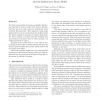Free Online Productivity Tools
i2Speak
i2Symbol
i2OCR
iTex2Img
iWeb2Print
iWeb2Shot
i2Type
iPdf2Split
iPdf2Merge
i2Bopomofo
i2Arabic
i2Style
i2Image
i2PDF
iLatex2Rtf
Sci2ools
106
click to vote
PLDI
1997
ACM
1997
ACM
Generational Garbage Collection and the Radioactive Decay Model
If a fixed exponentially decreasing probability distribution function is used to model every object’s lifetime, then the age of an object gives no information about its future life expectancy. This radioactive decay model implies there can be no rational basis for deciding which live objects should be promoted to another generation. Yet there remains a rational basis for deciding how many objects to promote, when to collect garbage, and which generations to collect. Analysis of the model leads to a new kind of generational garbage collector whose effectiveness does not depend upon heuristics that predict which objects will live longer than others. This result provides insight into the computational advantages of generational garbage collection, with implications for the management of objects whose life expectancies are difficult to predict.
Generational Garbage | Generational Garbage Collector | PLDI 1997 | Programming Languages | Rational Basis |
Related Content
| Added | 06 Aug 2010 |
| Updated | 06 Aug 2010 |
| Type | Conference |
| Year | 1997 |
| Where | PLDI |
| Authors | William D. Clinger, Lars Thomas Hansen |
Comments (0)

